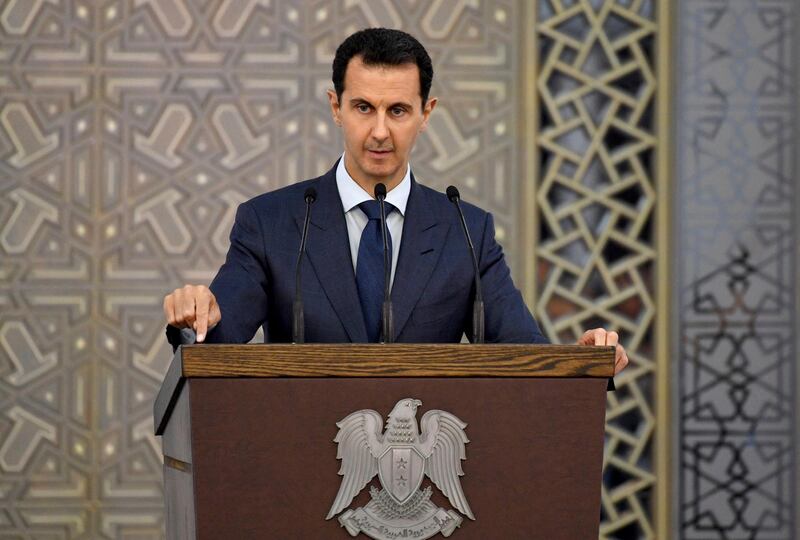Syrian president Bashar Al Assad attacked the role of “western countries” in Syria’s civil war in a speech delivered four years since his forces allegedly gassed a Damascus suburb.
The Syrian president praised his allies from outside Syria, including Russia, Iran and Hizbollah and sounded an optimistic note about his government’s prospects in the conflict.
“Talking about foiling the Western project doesn’t mean we are victorious; the battle is still going on, and the signs of victory are there, but victory itself is another thing,” Mr Al Assad said, according to Sana, Syria’s state-run news agency.
His words came nearly four years to the day his government is accused of carrying out a sarin gas attack that killed as many as 1,400 people.
The attack marked a turning point with regards to international involvement in the conflict. US president Barack Obama had said before the attack that use of chemical weapons by the Syrian government was a “red line” that would trigger US military action.
________________________
Read more:
[ Obama's failure to enforce his "red line" emboldened and strengthened Al Assad ]
[ Syria investigator quits ‘impossible’ role - and blames hollow UN Security Council ]
[ Syria chemical attack: Samples from site ‘test positive’ for sarin ]
________________________
Instead, the US brokered a last-minute deal with the Syrian government to allow inspection and destruction of its remaining chemical weapons stockpiles under the supervision of the Organization for the Prohibition of Chemical Weapons. Though many weapons were destroyed, OPCW officials have since said that the Syrian government was a reluctant partner in the effort and that whether all of the weapons were destroyed remains an open question.
The OPCW has confirmed chemical weapons have been used in the conflict repeatedly since 2013, with the most recent instance being an attack in northern Syria in April involving sarin gas.
News of April’s attack prompted US president Donald Trump to launch missiles and airstrikes against Syrian government infrastructure. But last month, Mr Trump decided to end a four-year-old CIA programme to train and support rebel groups fighting the Syrian government and the US military in Syria issued a directive to groups it supports that they should only fight ISIL, and not the Syrian government. The US has also recently worked with Russia to broker a cease-fire in southern Syria.
Such moves appear to validate Mr Al Assad’s strategy of attrition in a war that is now in its sixth year.
“The price of resistance is much lower than the price of surrender… we paid a dear price in Syria in this war, but we managed to foil the Western project,” Mr Al Assad said. “The West is like a snake, changing its skin according to the situation.”
The Syrian president vowed that relations would not be normalised with any countries that continued to support the opposition against him.
“We are not in a state of isolation as they think, but this state of arrogance makes them think in that way,” he said. “There will be no security cooperation or opening of embassies or role for some states that say they are looking for a solution until they cut off their ties with terrorism in a clear and unambiguous way.”
As Mr Al Assad spoke, the uneasy alliance the US has fallen into with the Syrian government was on display. The Syrian army on Saturday launched operations in parallel to those of the US-supported Lebanese army to oust ISIL from a stronghold straddling the Syrian-Lebanese border, and Syrian government forces have also been pushing against ISIL-controlled areas in eastern Syria from the west as US-backed Syrian militia forces move on them from the north under the cover of US airstrikes and artillery.
Though Syria’s war looks much different than it did in 2013, the attacks are far from forgotten.
In the eastern Damascus suburb of Saqba, one of the suburbs targeted in the 2013 attacks, an antigovernment activist named Abdulah Hafi used the word “doomsday” when asked to recall the event.
“I remember hundreds of kids not moving,” said Mr Hafi, who worked on an ambulance crew at the time of the attacks. “Lots of dead.”
Saqba remains under rebel control, and is one of the areas where the Russian government recently helped broker a ceasefire between the rebels and the government. But that ceasefire has been broken repeatedly, and Mr Hafi said that continued shelling by the Syrian government would prevent residents of Saqba from holding any public commemoration of the event.
“There were several ideas, but the conditions stopped us,” Mr Hafi said on Sunday. “After the ceasefire promises, nothing has changed. Five civilians were killed yesterday, and there was shelling today.”
“The first thing that comes to my mind – you can’t imagine that you will see that many dead people in just one time, in just one place. Hundreds of people,” said Humam Husari, a filmmaker who shot video on the day of the event that was broadcast worldwide.
Mr Husari, who lives in the suburb of Zamalka, which was also hit by the 2013 attacks, said that fighting there had quieted to the point where an event had been planned to mark the anniversary. He remains haunted by the event, and has been working on a dramatic film about the event with the participation of some of the survivors.
“I will show the trailer for my film, and people will share their stories,” Mr Husari said.
* Additional reporting from Reuters





